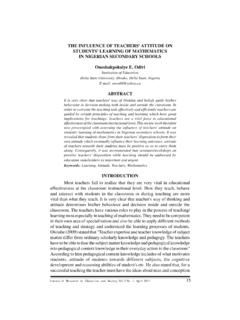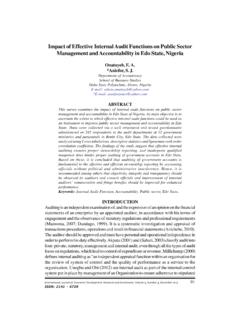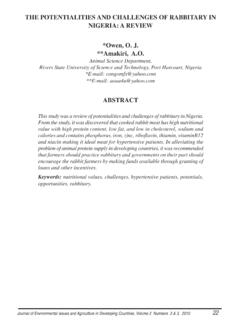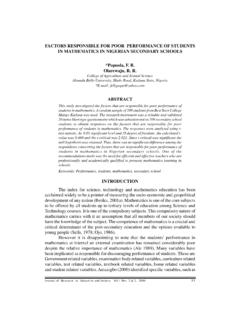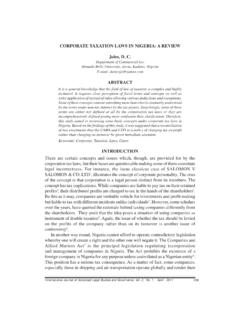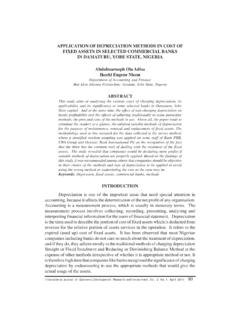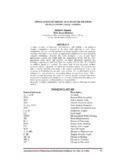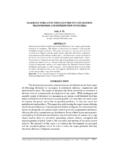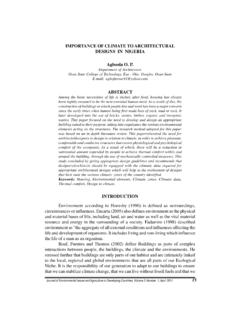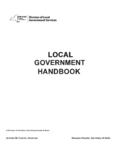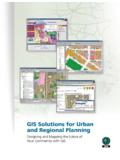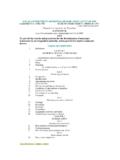Transcription of LOCAL GOVERNMENT AUTONOMY IN NIGERIA: …
1 International Journal of Advanced Legal Studies and Governance Vol. 1 , April 201098 LOCAL GOVERNMENT AUTONOMY IN NIGERIA: politics AND CHALLENGES OF THE 1999 CONSTITUTIONA saju, of Public AdministrationAhmadu Bello University, Kongo-Campus, ZariaKaduna State, : paper undertook a historical overview of thedevelopment of the LOCAL GOVERNMENT system in nigeria ,especially from 1950, when nigeria became a federal unit(that is North, West and East). It was discovered that before1976 when a unified LOCAL GOVERNMENT system was adoptedthroughout the country, each of the federating unit, laterstate, operated the type of LOCAL GOVERNMENT system that wasunique to their political needs, but the advent of militaryregime with its centralised form of GOVERNMENT affected thisformer arrangement.
2 But, with the re-emergence of civilianregime in 1979, the former arrangement was adopted. Thus,the 1979, 1989 and 1999 Constitutions recognised the localgovernment as a third tier of GOVERNMENT , subject to thecontrol of State governments. The abuse of these provisionsin the Constitutions, especially by the State GOVERNMENT , hasbrought to the fore-front the question of LOCAL governmentautonomy. Therefore, the only option is a review of theConstitution. Provisions should be put in place to check theloopholes that give room for such abuses by the : AUTONOMY , decentralisation, devolution, federalsystems, LOCAL GOVERNMENT , rural Journal of Advanced Legal Studies and Governance Vol. 1 , April 2010 INTRODUCTIONG lobally, various strategies and approaches have beenadopted or used by GOVERNMENT for the purpose of good governance,and in their efforts at distributing the state resources to reach thepeople at the grassroots.
3 However, there has not been congruenceor general agreement on which strategy is the best, especially inthe administration of the rural constitutes the basic and principle basisfor the establishment of LOCAL GOVERNMENT . A renownedInternational scholar of LOCAL GOVERNMENT , Manhood as quotedin Dalhatu (2006) that "too much concentration of political andeconomic power at one level would ultimately and inevitably leadto what he referred to as managerial constipation". According tohim, the basis of LOCAL GOVERNMENT is inextricably woven aroundthe principle of decentralization. LOCAL GOVERNMENT is the productof decentralised administration. He further defined decentralisationas:an arrangement by which the management of thepublic affairs of a country is shared by the central/state/province and LOCAL GOVERNMENT in a mannerthat the LOCAL GOVERNMENT is given reasonable scopeto raise funds and to use its resources to provide arange of socio-economic services and establishprogrammes to enhance the welfare of those residentin its area of , decentralisation involves the transfer of authorityon a geographical basis and is inform of de-concentration ordevolution.
4 Decentralisation by devolution is preferred in mostnations - state in order to promote rapid development of the country,this manifests itself in the establishment of LOCAL GOVERNMENT . Mostnation-states avoid centralisation because it inhibits the activeInternational Journal of Advanced Legal Studies and Governance Vol. 1 , April 2010100political participation of the citizens in the running of their ownaffairs, and could be by implementation; results in a situationwhereby despotism is extolled (Toyin In Omale, 2005). Thisprecisely explains why most countries of the world prefer todecentralise their administration by could be argued that centralisation of the governmentthough may appear to strengthen its power and grip over the peopleeffectively; it may as well weaken the ability to use this power andalso completely erode the basis of its legitimacy.
5 The power at thecentre is already over-burdened by so many problems of could any political issue, irrespective of its frivolities, beresolved without reference to the power at the centre. Unnecessarymeddling in or handling of these problems of LOCAL concerns bythe national GOVERNMENT may prevent it from dealing adequatelywith these problems. As such, it is imperative for an appropriatemechanism for dispersal and conservation of political power,(Dalhatu, 2006).The above assertion brought to the fore-front the reasonfor decentralisation and on this basis, the justification for theexistence of LOCAL GOVERNMENT . As asserted by Orewa and Adewumi(1992), the confusion had been on the form of decentralisation inwhich the LOCAL GOVERNMENT system in nigeria was based.
6 Is itdecentralisation by de-concentration or decentralisation bydevolution? This issue is tenser when it comes to the issue of localgovernment AUTONOMY in nigeria . Therefore, this paper examinesthe issue of LOCAL GOVERNMENT AUTONOMY in nigeria from ahistorical perspective. This is with a view to understanding theintricacies of the fundamental problem of LOCAL governmentautonomy in nigeria . The paper will also examine some of theinherent factors inhibiting LOCAL GOVERNMENT AUTONOMY in Journal of Advanced Legal Studies and Governance Vol. 1 , April 2010 THE HISTORY OF LOCAL GOVERNMENTDEVELOPMENT IN NIGERIAL ocal GOVERNMENT is literarily seen as the GOVERNMENT atthe LOCAL level. Some scholars (Olowu 1988, Adeyeye, 2000) havedistinguished LOCAL GOVERNMENT depending on the politicalarrangement of the nation, unitary or federal system.
7 Adeyeye(2000) defines LOCAL GOVERNMENT in the unitary state as "non-sovereign community possessing the legal right but which areessentially administrative agents of the central GOVERNMENT ". Onthe other hand, the United Nations Office for Public Administrationsees LOCAL GOVERNMENT as:A political subdivision of a nation (in a federalsystem) state, which is constituted by law and hassubstantial control of LOCAL affairs including thepowers to impose taxes or to exact labour forprescribed purposes. The governing body of suchan entity is , the Guideline for LOCAL GOVERNMENT Reform(FGN, 1976) defines LOCAL GOVERNMENT as: GOVERNMENT at LOCAL level exercised throughrepresentative councils established by law to exercisespecific powers defined areas.
8 These powers shouldgive the council substantial control over LOCAL affairsas well as the staff and institutional and financialpower to initiate and direct the provision of servicesand to determine and implement projects so as tocomplement the activities of the state and federalgovernment in their areas, and to ensure, throughdevolution of functions to these councils and throughthe active participation of the people and theirtraditional institutes , that LOCAL initiative andresponses to LOCAL head and conditions Journal of Advanced Legal Studies and Governance Vol. 1 , April 2010102 The implications of the above definitions are in four dimensions,these GOVERNMENT must be a legal entity distinct from thestate and federal GOVERNMENT must be administered by democraticallyelected GOVERNMENT must have specific powers to perform arange of functions assigned it by GOVERNMENT must enjoy substantial AUTONOMY toperform array of functions, plan, formulate and execute itsown policies, programmes and projects, and its own rulesand regulations as deemed for its LOCAL needs.
9 This autonomyincludes power to control its finance, recruit and disciplineits on these definitions, and their implications, could it be saidthat the LOCAL GOVERNMENT system in Nigerian is autonomous? Thispaper is aimed at addressing this fundamental history of LOCAL GOVERNMENT system in nigeria couldbe traced back to the pre-colonial period when powerful empiresand kingdoms existed in nigeria , such as; Oyo Empire, BornoEmpire, Sokoto Empire, Jukun Kingdom, Nupe Kingdom, and IgalaKingdoms, among others. These empires and kingdoms had othersmaller districts, wards, towns and villages which were subjectedto them. The subordinate governments operated their own uniqueadministration suitable for their cultural and religious needs andaspirations. The bulk of the administrative activities of thesekingdoms and empires took place at these levels.
10 This form ofadministration could be referred to as LOCAL advent of British colonial administration in Nigeriabrought about a change in LOCAL GOVERNMENT administration in whichthe method of leadership changed from the traditional to the Britishcolonial GOVERNMENT . The colonial administration of local103 International Journal of Advanced Legal Studies and Governance Vol. 1 , April 2010government that was established was based on Indirect Rule required that administration at the LOCAL level should be carriedout through the existing traditional rulers and institutions. In theareas where there were no existing traditional rulers, and/orinstitutions, like in the South East, new ones were created. Thisled to the establishment of Native Authority in its most rudimentalforms.
